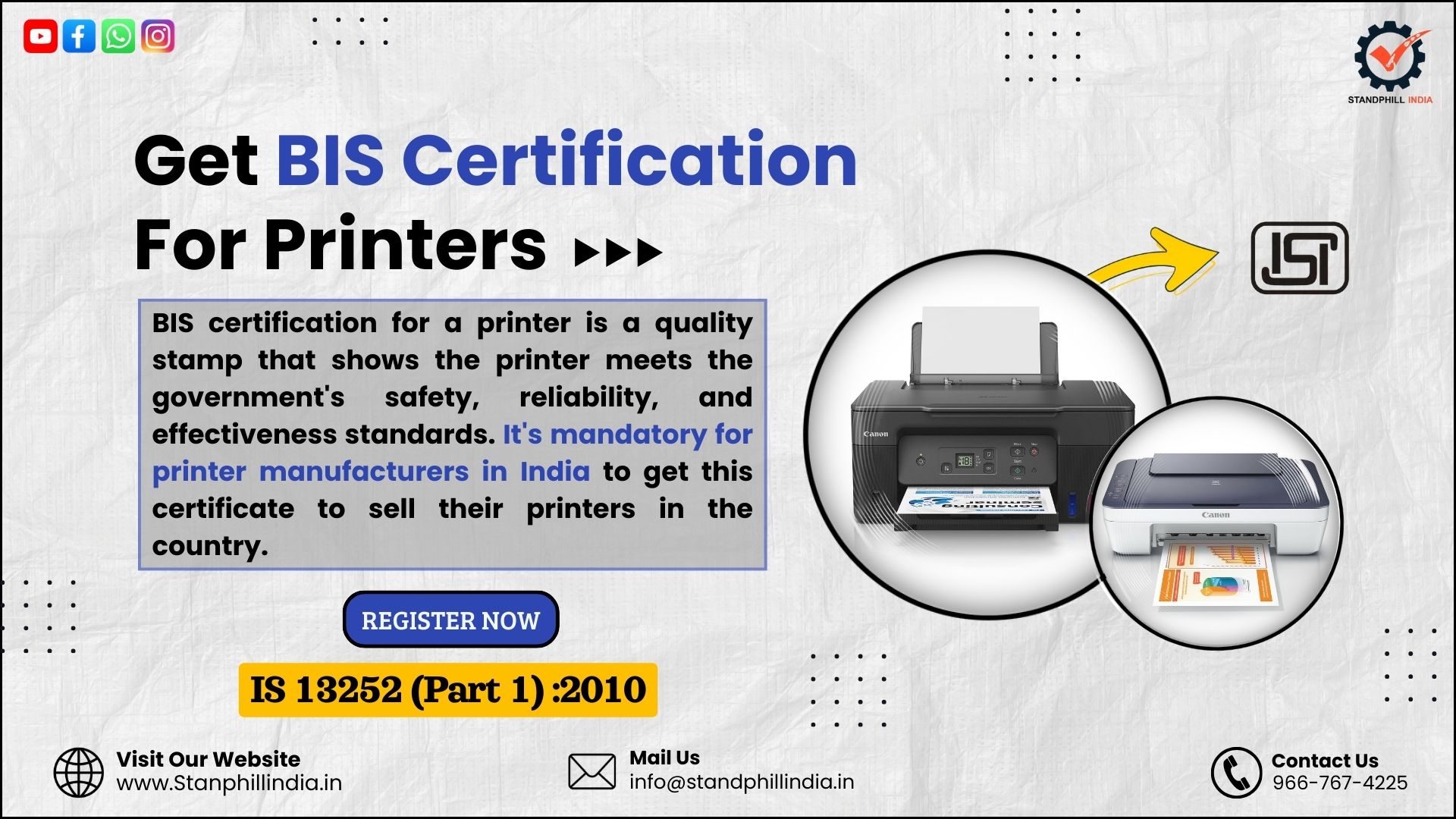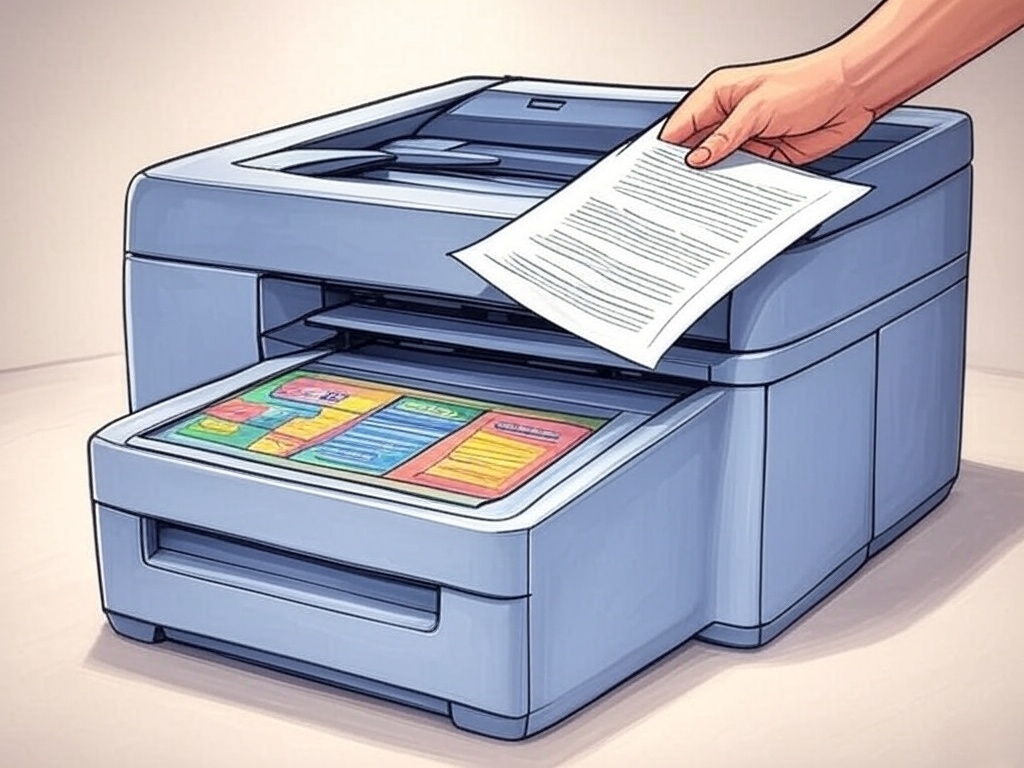Welcome to Standphill India
- CALL US: +91-9667674225
- Mail US : info@standphillindia.in
- Laxmi Nagar New Delhi

Table of contents
If you are a printer manufacturer or importer, you must get BIS certification to legally sell your printers in the Indian market. Without it, your products can be banned, and you may even face legal issues.
In this guide, you will learn everything about BIS certification for printers — what it means, why it's important, how to apply for it, what documents are needed, and how BIS consultants can help you through the process.
What is BIS Certification?
BIS (Bureau of Indian Standards) is a government body that sets rules to make sure products in India are safe and of good quality.
Printers must be certified under the Compulsory Registration Scheme (CRS) of BIS. This means the printers are tested to ensure they are safe to use and meet the required standards.
For printers, the relevant standard is:
IS 13252 (Part 1): 2010 – This applies to Information Technology (IT) equipment, which includes printers.
Once a product clears all the tests and inspections, the manufacturer can use the ISI mark, which shows that the product is certified by BIS.
Why is BIS Certification Important for Printers?
Here are the main reasons why BIS certification is important:
1. Legal Requirement
It is mandatory for all manufacturers and importers of printers.
Selling uncertified products is illegal in India.
2. Safety and Quality Guarantee
BIS certification ensures that printers are safe to use.
They are tested for electrical safety, durability, and performance.
3. Customer Trust
Indian consumers trust products that have the ISI mark.
Certified products are considered high-quality and reliable.
4. Bigger Market Opportunities
Many retailers and government tenders require BIS-certified products.
Certification helps expand your business across India.
5. Stops Low-Quality Imports
BIS helps prevent cheap, unsafe, or substandard printers from being sold in the Indian market.
Is BIS Certification Mandatory for Printers?
Yes, it is 100% mandatory.
Whether you are making printers in India or importing them from another country, you must get them BIS-certified before selling them.
Who Needs BIS Certification?
1. Indian Manufacturers
All Indian printer manufacturers must get BIS certification before selling their products.
2. Importers
If you are importing printers from other countries to sell in India, you must get them BIS certified.
What Happens If You Don’t Get BIS Certification?
If you try to sell printers in India without BIS certification:
You may face heavy penalties and legal action.
Your products can be banned or removed from shops and online platforms.
You won’t be allowed to sell through government or big retail channels.
Steps to Get BIS Certification for Printers
Here’s a step-by-step guide to help you understand how to get BIS certification:
Step 1: Identify the Right Indian Standard
For printers, you must comply with IS 13252 (Part 1): 2010.
Step 2: Apply on the BIS Portal
You need to:
Register on the BIS CRS website.
Fill the application form with details like:
Product name and model
Manufacturer’s name and address
Factory location
Pay the required application fees.

Step 3: Get Your Product Tested
Send your printer to a BIS-approved testing laboratory.
Lab tests will check:
Electrical safety – to ensure the printer doesn’t cause shock or fire.
Durability – to make sure it works well over time.
Power consumption – whether it follows energy-saving guidelines.
Step 4: Factory Audit
A BIS officer will visit your manufacturing unit to check:
Production methods
Materials used
Quality control systems
Step 5: Get the BIS Certificate
If everything goes well, BIS will issue a certificate of registration.
You can now use the ISI mark on your printers.
Step 6: Renew and Maintain Compliance
BIS certification is valid for a certain time period (usually 2 years).
You must renew it before expiry.
BIS can do surprise factory inspections to check if you are still following the standards.
Documents Required for BIS Certification
To apply for BIS certification for printer, you must submit the following documents:
Company registration documents
Manufacturing license (for Indian factories)
IEC (Import Export Code) for importers
Test report from BIS-approved lab
Product technical specifications and manuals
Factory address proof and layout
Photo ID and authorization letter for the company representative
Agreement between Indian importer and foreign manufacturer (if applicable)
Challenges in Getting BIS Certification
Getting BIS certification is important, but it is not always easy. Here are some common issues businesses face:
1. Paperwork Mistakes
A small error in your documents can delay the process.
2. Strict Testing Rules
Your printer must pass all technical and safety tests.
If it fails, you may need to make changes and reapply.
3. Factory Compliance
Your factory must follow standard production and quality control rules.
4. Time Delays
The process can take weeks or even months, depending on the application and testing timeline.
How Standphill India Can Help You
Hiring a BIS certification consultant can save you time, money, and stress. Here’s how they help:
1. Expert Guidance
Consultants help you choose the right standard, prepare documents, and complete the application.
2. Faster Processing
They make sure everything is correct and submitted on time to avoid delays.
3. Factory Audit Support
Consultants help you prepare your factory for BIS inspection.
4. Ongoing Support
They remind you when your certification is about to expire and help with renewals and future audits.
Conclusion
BIS certification for printers is not optional — it is a legal requirement in India. Whether you manufacture printers or import them, getting BIS certification ensures that your product is safe, high-quality, and trustworthy.
With BIS certification, you can:
Expand your business across India
Build customer trust
Avoid legal issues
Enter government and corporate tenders
If the process feels complicated, you can always take help from a BIS certification consultant who will guide you from start to finish.
Start your BIS certification journey today and make your printers ready for the Indian market!
Our Frequently Asked Questions
Request a call back.
For Business: For Business inquiry fill our short feedback form or you can also send us an email and we’ll get in touch shortly, or Toll Free Number +91 85279 30453.
Office Hours : 09:00 and 20:00 Mon to Sat, Sun - Closed
